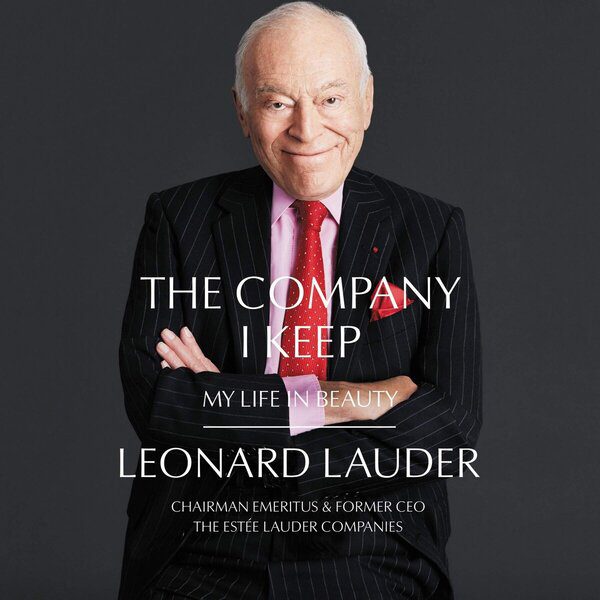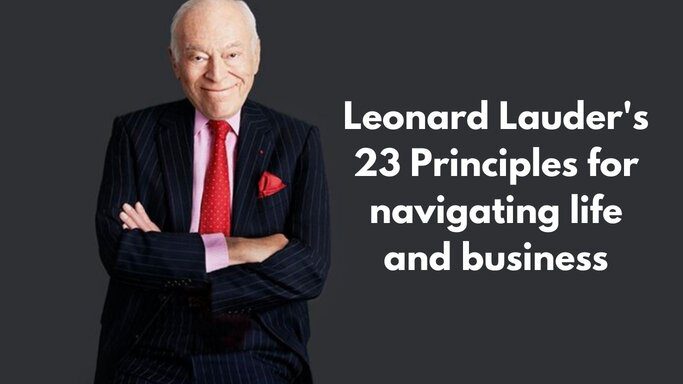In his 2020 autobiography, The Company I Keep, former CEO and chairman emeritus of The Estée Lauder Companies, Leonard Laude shared 23 ideas that he has found to be true throughout his life and career at Estée Lauder. The lessons are divided into two sections: Leadership Lessons and Market Wisdom.

LEADERSHIP LESSONS
It’s my neck
Accountability is something I learned in the Navy. Every- one is accountable for doing their job well; otherwise, the ship can’t perform well. That’s the only way you can run a company—or a team. As an accountable leader, you assume ownership for the performance of everyone reporting to you, even if you don’t know about it. You are responsible for every decision and action made, either by you or by others who report to you, because those decisions and actions reflect your leadership. If you cannot take ownership of every decision, then you are in the wrong job. The most fundamental message is this:
If you don’t take responsibility today, you will surely regret it tomorrow.
Act like an owner to get people to think like an owner
When I walk through the hall of the company, if I see a piece of paper on the floor, I pick it up. It’s important for employees to see you doing that. Be- cause if you don’t care, why should they? If they see that there’s paper left on the floor, they’ll feel it’s okay to have a sloppy work environment. And if their workplace is allowed to be messy, they may be careless about other things: how they deal with customers, how they make our products.
Ownership doesn’t come from the shares of stock that you have. It comes from the responsibility you feel for your company and your colleagues.
Ignore the “Anvil Chorus
This is a corollary to being an accountable leader. The Anvil Chorus
Our director of creative services, June Leaman, often said,
“One idea is a great idea. Two ideas are less effective. Three ideas are ineffective.” One hundred people will have one hundred different opinions. June called this phenomenon “the Anvil Chorus,”
You can’t run a company with an Anvil Chorus.
I never relied on a committee for a final decision. Committees are the death of creativity and productivity. Everyone loves the phrase “Ask the task force.” But a task force is just another term for the “Anvil Chorus.” It will flatten a good idea as thoroughly as a blacksmith’s hammer will flatten a piece of hot metal.
Never make an important decision without a woman at the table
Our great strength as a company has derived from the fact that from the beginning, we had a woman giving women the products and knowledge to make themselves feel beautiful, as opposed to Charles Revson telling women that he, as a man, knew what would make women desirable to men.
Make tactical mistakes, not strategic ones
When it comes to strategy, you can make tactical mistakes but you cannot afford to make a strategic mistake. What do I mean? A tactical mistake is one that, if you make it today, will only cost you today. A strategic mistake is one that, if you make it today, will cost you tomorrow—and tomorrow and tomorrow.
Start with “Yes”
In my early days with the company, I heard “no” a lot. I would call the cosmetics buyer at store after store and try to make a date to visit them. They would say, “We don’t need a new prestige line. We have enough.” Then they’d hang up the phone. Demoralizing? Not really.
As I see it, the word “no” really means “how” and “when.” The right timing and reframing can turn a “no” into a “yes.”
Hiring, Firing, and working with people
Hire People Smarter than You
You can be the head of a company or the leader of a team, but you can’t do everything. You can’t be there to direct all the time. You have to hire surrogates—thoughtful, responsible people who enhance your knowledge, extend your reach, and pump up your performance.
They don’t have to be like you—in fact, the last thing you want is a team of mini-mes. Difference— whether it’s a different background, different ethnicity, different age, or different gender—is a source of strength. As a man leading a beauty company that markets primarily to women, I can’t emphasize that strongly enough. Certainly, that’s been one of the sources and ongoing drivers of our success. In order to succeed, you must look past the horizon. How do you do that? By hiring people who are smarter than you.
There’s just one corollary: Beware of people who think they’re super-smart—in other words, those people who, like the younger me, think they’re the smartest person in the room. They have no humility. That not only makes them difficult to work with—and work for—but it’s just a matter of time before they get too smart for their own good and make a mistake that can harm the company.
The “pussycat factor”
I was great friends with Helen Gurley Brown, the legendary editor who turned Cosmopolitan into a wildly successful magazine. Helen told me that when the news broke that she had been offered the job at Cosmo, she got a telephone call from her best friend:
“Helen! I’m coming to New York to help you put out the magazine.” Helen’s response: “Pussycat, I can’t hire you be- cause I can’t fire you.” The lesson of the pussycat factor:
Don’t hire your best friends and don’t hire former classmates. In short, don’t hire people that you can’t fire. Friendship is friendship but business is business.
People don’t work only for money. They work for recognition.
Find a way to congratulate someone for a job well done. Even if your note is just a little one-liner, when you say “thank you for doing a good job,” it’s more likely the recipient will go to the ends of the earth for you.
And if you thank them often enough, it will give you the permission to point out areas in which they can improve. Once you praise them for doing the right thing, you’ve earned the right to criticize them for doing the wrong thing. And they’re more likely to pay attention.
Think before you criticize and always praise long before you criticize.
Cut your losses
My father had a saying when he had to fire someone: “Better a sharp pain in the end than pain without end.” If you’re having trouble with a person who looks like they will not be able to improve, it’s better to help them leave than to suffer with them. Or if a product you launch isn’t selling, don’t allow it to lose money forever just because it was your idea.
There is a point beyond which patience becomes neglect. Fail fast. Cut your losses.
The best way to fire someone
Everyone in this world has worth. If you cannot get someone to produce for you in a satisfactory manner, it is almost always your fault and you should acknowledge that, honestly and with respect.
MARKET WISDOM
You are defined by your distribution
My mother instinctively knew that you’re known and judged by the company you keep. She constructed our entire strategy around this. We wanted to sell our products in high-end specialty stores because their prestige gave us prestige. The luxurious setting emphasized that Estée Lauder brands were luxe brands.
Conversely, you’re known as much by where you don’t sell as by where you do sell. Don’t dilute your brand by following the siren song of mass distribution. If you’re in luxury, stay in the luxury segment. Don’t give up your core identity for the volume that can be gleaned by selling in a distribution channel that does not match the equity of your brand.
First to market always wins
When you launch first, you have no competition to sweep aside. You automatically become the authority. It’s for the next group of competitors to try to take your authority away, which is much more difficult than you seizing and protecting the high ground.
Get Ahead of the curve
How do you ensure you’re first to market with a big idea? Being creative in business demands more than just knowing how your business works. It means having and honing a sense of where your business stands in a larger context. It means seeing the world through a wide-angle lens, so you can look for and leverage important geopolitical moments.
Launch at the top, stay at the top
If you launch at the top of the market, you have two ways to go: up or down. If you launch into the heart of the market, there’s always someone who will sell cheaper than you; you’ll have no way to go but follow them in a race to the bottom. Launch first, launch strong, and stay strong.
It’s not rocket science. It’s giving yourself permission to open your mind wide and let your imagination soar while keeping your feet firmly planted on the ground. We are all the authors of our own future. Dream big.



Comments are closed.